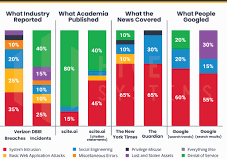Data breaches have become an alarming norm in today’s digital age, with 2023 witnessing some of the most significant and impactful incidents. These breaches highlight vulnerabilities in security measures and offer valuable lessons for organizations to enhance their data protection strategies. Here are sixteen notable data breaches of 2023 and the critical lessons learned from each incident.
Global Financial Corporation Breach
In early 2023, a leading global financial corporation suffered a massive data breach, compromising the personal and financial information of millions of customers. The breach was attributed to outdated security systems and inadequate encryption protocols. Organizations must regularly update their security infrastructure and employ robust encryption methods to protect sensitive data. Regular updates and patches to software, particularly POS systems, can close security gaps that hackers might exploit.
Tech Giant Employee Data Leak
A prominent tech company experienced a breach in which employee records, including social security numbers and salary details, were exposed due to a phishing attack that targeted HR personnel. Continuous employee training on phishing and social engineering tactics is essential to prevent such breaches. Ensuring that security systems are up-to-date and data is encrypted is crucial in protecting sensitive information from unauthorized access.
Retail Chain POS System Attack
A major retail chain’s point-of-sale (POS) systems were hacked, resulting in the theft of millions of customers’ credit card information. The attack exploited vulnerabilities in the POS software. Regularly updating and patching POS systems and other software is critical to protect against such exploits. Implementing robust backup strategies and disaster recovery plans can mitigate the impact of ransomware attacks. Regularly testing and securing APIs can prevent unauthorized data access and exposure.
Healthcare Provider Ransomware Attack
A large healthcare provider was hit by a ransomware attack, which encrypted patient records and demanded a hefty ransom for decryption. The attack severely disrupted healthcare services. Implementing robust backup and disaster recovery plans can mitigate the impact of ransomware attacks. Investing in advanced threat detection and response capabilities is necessary for defending against sophisticated cyber espionage. Adopting secure coding practices and conducting regular security testing can prevent vulnerabilities like SQL injection.
Social Media Platform Data Exposure
A popular social media platform exposed user data due to an API vulnerability. The breach affected millions of users, revealing personal messages and contact details. Regularly testing and securing APIs is vital to prevent unauthorized access and data leaks. Strict access controls and monitoring can help detect and prevent data breaches caused by insider threats.
Government Agency Cyber Espionage
A national government agency experienced a sophisticated cyber espionage attack that compromised classified information. The breach was linked to nation-state actors using advanced persistent threats (APTs). Government agencies must invest in advanced threat detection and response capabilities to defend against APTs.
E-Commerce Site SQL Injection Attack
An e-commerce site fell victim to an SQL injection attack, which allowed hackers to access the database and steal customer information, including payment details. Implementing secure coding practices and regular security testing can prevent SQL injection and other common vulnerabilities. Cloud Configuration Audits Proper configuration and regular audits of cloud storage settings are essential to prevent data exposure.
Telecommunications Provider Insider Threat
A telecommunications provider faced a data breach when a disgruntled employee accessed and leaked customer data. The breach highlighted the risks associated with insider threats. Implementing strict access controls and monitoring employee activities can help detect and prevent insider threats. Patch Management for Educational Institutions Prioritizing patch management and vulnerability assessments can protect student records and institutional data.
Cloud Storage Misconfiguration
A major corporation’s cloud storage misconfiguration led to the exposure of sensitive business documents and customer data. The breach was caused by improper security settings. Properly configuring and regularly auditing cloud storage settings are essential to prevent data exposure. Third-Party Vendor Security Assessments Conducting thorough security assessments of third-party vendors is critical to safeguarding sensitive data.
Educational Institution Breach
A renowned educational institution experienced a data breach that compromised student records due to an unpatched vulnerability in their administrative systems. Educational institutions must prioritize patch management and regular vulnerability assessments to protect student data. Multi-Factor Authentication Implementing MFA can strengthen authentication and protect user accounts from unauthorized access.
Insurance Company Data Theft
An insurance company suffered a data breach where hackers accessed customer policy information and claims data through a compromised third-party vendor. Conducting thorough security assessments of third-party vendors is crucial to ensure the protection of sensitive data. Unique, Strong Passwords Encouraging the use of unique and strong passwords, along with account lockout mechanisms, can prevent credential stuffing attacks.
Hotel Chain Loyalty Program Breach
A global hotel chain’s loyalty program was breached, exposing members’ personal information, including passport numbers and travel itineraries. The attack exploited weak authentication mechanisms. Strengthening authentication methods, such as implementing multi-factor authentication (MFA), is critical to protect user accounts. Customer Education and Anti-Phishing Technologies Ongoing customer education and robust anti-phishing technologies are essential to combating phishing attacks.
Gaming Company Credential Stuffing Attack
A popular gaming company faced a credential stuffing attack, where hackers used stolen credentials from other breaches to access user accounts and steal in-game assets. Encouraging users to employ unique, strong passwords and implementing account lockout mechanisms can mitigate credential stuffing attacks. Supply Chain Security Measures Implementing stringent supply chain security measures and monitoring for unusual activity can detect and prevent supply chain attacks.
Banking Sector Phishing Campaign
Several banks were targeted by a coordinated phishing campaign, resulting in the theft of customer login credentials and subsequent unauthorized transactions. Ongoing customer education and the implementation of robust anti-phishing technologies are essential to combat phishing attacks. Encryption and Access Controls for Non-Profits Ensuring the encryption of sensitive data and implementing strong access controls are fundamental to protecting donor information.
Energy Sector Supply Chain Attack
An energy sector company was breached through a supply chain attack, where attackers compromised a software provider to infiltrate the target’s network. Implementing stringent supply chain security measures and monitoring for unusual activity can help detect and prevent such attacks. By adopting these practices, organizations can significantly enhance their cybersecurity posture and better safeguard against the ever-evolving landscape of cyber threats.
Non-Profit Organization Data Breach
A large non-profit organization experienced a data breach that exposed donor information due to a lack of encryption and inadequate access controls. Ensuring the encryption of sensitive data and implementing strong access controls are fundamental to protecting donor information. Continuous education on recognizing and avoiding phishing attacks is vital to prevent breaches caused by human error.
The data breaches of 2023 underscore the importance of robust cybersecurity practices across all sectors. Each breach provides critical lessons that can help organizations bolster their defenses against future threats. By understanding these lessons and implementing best practices, businesses can better protect their data, maintain customer trust, and avoid the severe consequences of data breaches.







